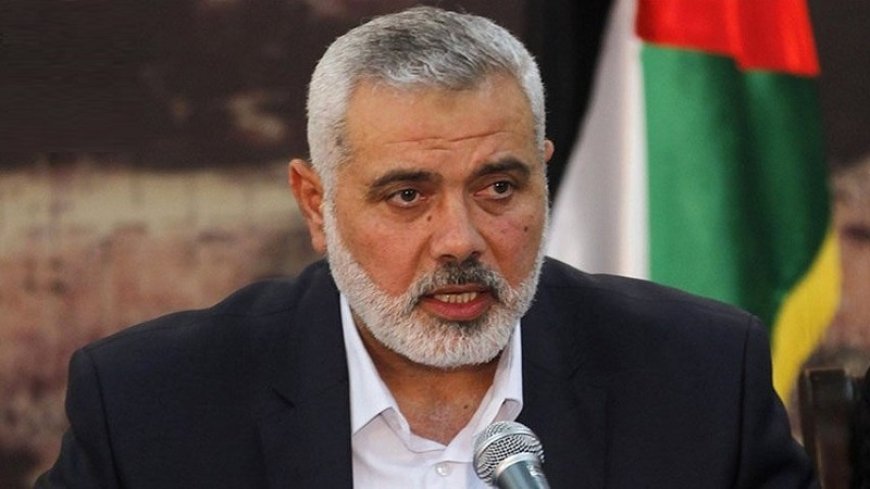Hamas' clever response to Biden's plan and throwing the ball in Netanyahu's court
Ismail Haniyeh, the head of Hamas's political office, and Ziad al-Nakhleh, the secretary general of Islamic Jihad, at the head of a delegation from the two movements, gave the resistance groups' response to the proposed plan for a cease-fire and prisoner exchange. in a meeting with the Prime Minister of Qatar and presented it to him to send to Egyptian officials.

Ismail Haniyeh, the head of Hamas's political office, and Ziad al-Nakhleh, the secretary general of Islamic Jihad, at the head of a delegation from the two movements, gave the resistance groups' response to the proposed plan for a cease-fire and prisoner exchange. in a meeting with the Prime Minister of Qatar and presented it to him to send to Egyptian officials.
In the response of the resistance groups, priority has been given to the interests of the Palestinian people, the necessity of a complete cessation of the war and the complete withdrawal of the occupying forces from the Gaza Strip. John Kirby, spokesman for the White House National Security Council, said the United States had received Hamas' response through intermediaries and was carefully reviewing the details. In a press conference with his Qatari counterpart in Doha, US Secretary of State Anthony Blinken, while confirming the receipt of Hamas's response, clarified that Hamas has requested changes that can be accepted.
However, the Zionist newspaper "Yediot Aharnot" published in the occupied territories on Tuesday night quoted a Zionist official and claimed that the Hamas movement has rejected US President Joe Biden's plan for negotiations. In a statement, the Hamas movement emphasized that it has always called for an end to the war and the exchange of prisoners and has clearly welcomed Joe Biden's plan and the Security Council resolution. He said that contrary to America's claims, the Israeli regime does not accept any of these plans. Hamas's response comes after a US-proposed resolution for a ceasefire in the Gaza Strip was approved without any objections or vetoes at a council meeting on Monday local time.
The passage of this resolution came while for the past eight months, the United States, with its firm support for Israel, blocked the passage of any resolution imposing a cease-fire in Gaza and condemning Hamas for the Al-Aqsa Storm military operation of October 7. 2023, and working with Israel to defeat this move. Security Council Resolution 2735, which has seven clauses, states that the resolution proposed by the United States recalls all relevant resolutions regarding the situation in the Middle East, including the issue of Palestine, and recognizes the continued diplomatic efforts of Egypt, Qatar and the United States with the aim of reaching a comprehensive ceasefire agreement that includes three phases.
A) Phase 1: An immediate ceasefire, complete with the release of hostages including women, the elderly and the wounded, the return of the bodies of some of the dead hostages, the exchange of Palestinian prisoners, the withdrawal of Israelis from populated areas of Gaza, the return of Palestinian civilians to their homes and neighborhoods in all areas of Gaza, including in the north, and the safe and effective delivery of large-scale humanitarian aid throughout the Gaza Strip.
(b) Step 2: By mutual agreement, a permanent cessation of hostilities, in exchange for the release of all hostages still in Gaza, and the complete withdrawal of Israeli forces from Gaza.
(c) Step 3: Launch a major multi-year reconstruction plan for Gaza and return the bodies of all dead hostages still in Gaza to their families.
The resolution states that if the negotiations for the first phase last more than six weeks, the ceasefire will continue as long as the negotiations are ongoing, and the United States, Egypt and Qatar are ready to ensure that the negotiations continue until all agreements to be concluded. US President Joe Biden on May 31, on the eve of the elections on November 5 this year, announced that Israel presented a new proposal for a cease-fire and prisoner exchange, which was presented to Hamas through Qatar, and asked the parties not to lose this opportunity and reach an agreement on this proposal.
Biden's proposal includes a cease-fire and the gradual release of hostages in exchange for Palestinians imprisoned in Israel, which would eventually lead to a permanent end to the war. Hamas's response to Joe Biden's proposal is not limited to accepting or rejecting this proposal, but includes a package that includes many things, including a permanent ceasefire, the complete withdrawal of the occupation forces from Gaza, the reconstruction of the Gaza Strip, the return of refugees in their areas, reaching a prisoner exchange agreement and other issues discussed in the ceasefire plan. Now, with the announcement of the stance of the resistance forces and Hamas, the ball is in the court of Israel and America, who must stick to what they have announced many times to reach an agreement on a permanent and complete ceasefire with the withdrawal of the occupying forces from the Gaza Strip.
In fact, by accepting the plan proposed by Biden, Hamas has not only demonstrated its commitment to stopping the war and freeing the people of Gaza from the imposed pressures, but has made the covert opposition of Israel and Netanyahu's right-wing cabinet become public, which could also lead to a resurgence of internal differences between Biden and Netanyahu, and given the widespread internal opposition in Netanyahu's cabinet, will provide the basis for his collapse.













































